As an avid game developer and laptop enthusiast, I understand the unique challenges of finding the best laptop for Unity game development. Unity is a powerful and versatile game engine that has become increasingly popular among both indie developers and AAA studios. With a robust suite of tools and assets, it's vital to have a laptop that can keep up with the demands of the platform while providing a seamless workflow. After meticulously reviewing an extensive spreadsheet of recent laptop releases, comparing specs, and analyzing both professional and user-generated reviews, I've narrowed down the top laptops suited for Unity game development based on specific requirements and various price ranges.
When selecting the best laptop for Unity, performance is crucial. Unity developers require a laptop with a powerful processor and adequate RAM to handle complex scenes, real-time rendering, and the occasional compilation of code. Additionally, a dedicated GPU is highly recommended, as it ensures smooth performance when working with 3D models, animations, and shaders. Equally important is a high-quality display to accurately represent colors, textures, and details in your game world, as well as ample storage space for your ever-growing asset library.
As a Unity developer, you might be working on projects ranging from simple mobile games to ambitious console or PC titles. You may also be collaborating with other developers, showcasing your work at events, or participating in game jams. Considering these factors, the ideal laptop should offer a balance between portability and performance without breaking the bank. With this game development-specific guide, you'll be able to find the perfect laptop tailored to your needs, ensuring that your Unity projects run smoothly and efficiently, allowing you to focus on creating amazing games.
Processor Power!
With the emergence of Apple's ARM-based M1, M1 Pro, M1 Max and M2 system-on-chip modules, and the 20% of the market AMD has managed to take with the 6th generation Ryzen processors, it can be hard to decide on the right processor for game development with Unity.
Intel's 13th-gen processors have yet to reach laptops and the latest from Intel is the 12th-generation chips that have adopted a hybrid performance/efficiency core design (based on big.LITTLE). If you need a good battery life in a PC laptop, then Ryzen models are best.
For MacBooks, the choice is easy – go for a MacBook Pro. For PCs, you'll need a fast CPU to compile your game and perform well-optimized code analysis. If you're using an integrated graphics chip (IGP), then I'd recommend going for an H-series processor since they tend to be more power-efficient than U-series processors.
When choosing a processor for your development machine, consider its clock speed and core count; these two factors are crucial when evaluating the overall performance of the processor. I use Cinebench R23 to compare laptop processors because it's a popular benchmark that measures single-core performance; however, if you're looking for a gaming laptop – I'd recommend using 3DMark benchmarks as they better reflect gaming performance.
Recommended Processors for Each Price Bracket
| Price Range | Recommended Processor |
|---|---|
| Budget ($200-400) | Intel i3-1115G4 |
| Mid-Range ($400-700) | Intel i5-10310U |
| High-End ($700+) | Intel i7-1180G7 |
Graphics Power!
In the laptop market, Nvidia continues to dominate the graphics card landscape. While Nvidia has recently released the RTX 40 series, these are not yet available on laptops (expected in 2023). The latest notebook cards are in the RTX 30 series, such as RTX 3070 Ti.
Desktop GPUs have become more power-hungry in recent years; the gap between power-limited laptop graphics and desktop graphics cards has widened. Furthermore, Nvidia has discontinued the Max-Q label for its RTX graphics cards, so an exact GPU wattage is determined by a laptop manufacturer (OEM). This unfortunately results in a wide variance in graphics performance even in laptops with the same GPU chipset.
While a CPU can be used to accelerate some tasks (such as physics or AI), most of the work in game development is done by the GPU. This is why it's important to invest in a good graphics card when developing games with Unity. Fortunately, you don't need to invest in an expensive one. Here, I've put together a list of recommended GPUs for game development, based on their 3DMark scores from desktop PCs with similar CPUs as found in many laptops today (i5/Ryzen 5).
Recommended GPUs for Game Development
| GPU | 3DMark Score | Pros | Cons |
|---|---|---|---|
| GeForce GTX 1650 | 5650 | – Affordable – Low power consumption |
– Low performance |
| GeForce RTX 3050 | 6133 | – Low power consumption – Decent performance |
– Moderately priced |
| GeForce RTX 2060 | 7000 | – Great performance – Ray tracing support |
– Expensive |
Keep in mind that if you're looking for a gaming laptop that's also suitable for work, you might want to consider investing in a high refresh rate display (144Hz or higher) and possibly an IPS panel instead of TN if you're working with colors or video editing.
Maximizing RAM
When it comes to game development with Unity, the amount of RAM in your laptop matters. Most mid-range laptops come with 16 GB of RAM and high-end – 32 GB or more. Latest-gen Intel and AMD CPUs support DDR4 and DDR5, though DDR5 is still quite expensive and needs time to mature as a technology.
While you can get by with 8 GB of RAM, 16 GB is the sweet spot for most developers. 32 GB is only necessary if you're working on a large project with multiple scenes open at once. For gamers and other casual users, 8 GB is more than enough.
DDR5 vs. DDR4 – while it's not a make-or-break difference, it's nice to have the latest standard if you can afford it. If you're looking for an upgradeable laptop, make sure it has two SODIMM slots instead of one; that way, you can add more RAM down the line without having to replace the entire module (which is a pain).
Minimum RAM: 8 GB
Recommended RAM: 16 GB
High-end RAM: 32 GB
FAQ
Q: What are the recommended laptop specs for Unity game development?
When it comes to Unity game development, you'll want a laptop that can handle the demanding requirements of the software. For smooth performance and efficient workflows, we recommend a laptop with at least 16 GB of memory, a GeForce RTX 3050 graphics card, and an i5-10310U processor. These specifications will give you the power and capability you need to create amazing games in Unity.
Can I use a laptop for Unity game development?
Absolutely! While desktop PCs have traditionally been the preferred choice for game development, advancements in laptop technology have made it possible to develop games on the go. With the right specifications, a laptop can provide the performance and portability you need for Unity game development. Just make sure your laptop meets the recommended requirements for a smooth experience.
What are the minimum laptop requirements for Unity game development?
The minimum laptop requirements for Unity game development are an 8 GB of memory, a GeForce GTX 1650 graphics card, and an i3-1115G4 processor. While these specs may be able to handle simple projects and smaller games, keep in mind that more complex projects may require higher specifications for optimal performance.
Which laptops are best for Unity game development?
There are several laptops on the market that are great for Unity game development. Here are a few recommendations at different price points:
- HP Victus: This budget-friendly option comes in at around $890 and offers solid performance with its recommended specs.
- Dell G15: With a price of around $1,230, the Dell G15 provides a great balance between performance and affordability.
- ASUS ROG Strix G15 G513RM: If you're looking for a mid-range option, the ASUS ROG Strix G15 G513RM is a fantastic choice. Priced at around $1,700, it offers excellent performance for Unity game development.
- ASUS ROG Strix Scar: For those with a higher budget of $2,310, the ASUS ROG Strix Scar is a premium option with top-of-the-line specs.
- Lenovo Legion Pro 7i 16: If you're willing to invest in a high-end laptop, the Lenovo Legion Pro 7i 16 is an excellent choice. Priced at $3,390, it offers exceptional performance and features.
- Dell XPS 17 9720: For professionals who require the best of the best, the Dell XPS 17 9720 is a top-tier option. With a price tag of $5,600, it offers unmatched performance and quality.
Is a dedicated graphics card necessary for Unity game development on a laptop?
While a dedicated graphics card is not strictly necessary for Unity game development on a laptop, it is highly recommended. A dedicated graphics card, such as the GeForce GTX 1650 or GeForce RTX series, will significantly enhance the performance and rendering capabilities of Unity. It will allow you to work with more complex graphics and create visually stunning games. So, if you're serious about game development, investing in a laptop with a dedicated graphics card is a wise decision.
How much RAM do I need for Unity game development on a laptop?
The amount of RAM you need for Unity game development depends on the complexity of your projects. While the minimum requirement is 8 GB, we strongly recommend opting for at least 16 GB of RAM. This will provide ample memory for multitasking, running Unity, and testing your games without any hiccups. Additionally, if you plan on working with larger assets or running multiple resource-intensive programs simultaneously, you may want to consider 32 GB of RAM for optimal performance.
Can a budget laptop handle Unity game development?
Yes, a budget laptop can handle Unity game development, but it will have its limitations. While you may be able to create simpler games and work on less resource-intensive projects, budget laptops often lack the processing power and graphics capabilities required for more complex game development tasks. However, with the right optimizations and careful management of your project's assets, you can still make progress on a budget laptop. Just keep in mind that you may experience longer build times and lower frame rates compared to more powerful machines.
What processor is recommended for Unity game development on a laptop?
For Unity game development on a laptop, we recommend a laptop with an i5-10310U processor or higher. Processors like the i7-1180G7 offer even better performance. These processors have the necessary power and speed to handle Unity's CPU-intensive tasks, such as building and running your games. They will provide a smoother development experience, allowing you to focus on creating your game rather than waiting for processes to complete.
Are gaming laptops suitable for Unity game development?
Yes, gaming laptops are
6 Best Laptops for Game development with Unity
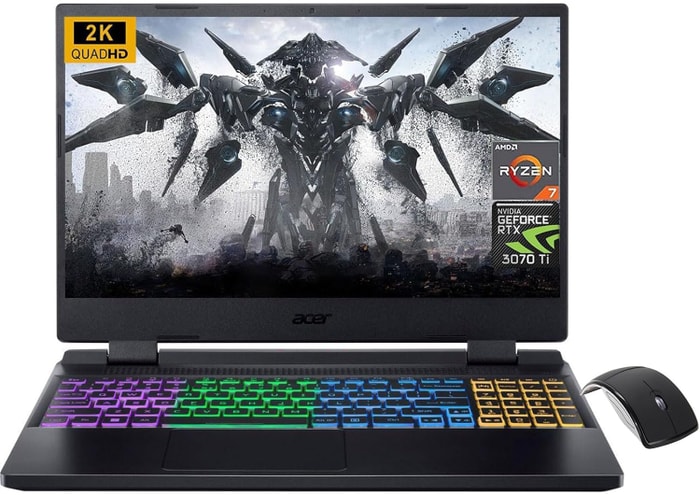 $680
$6801.acer Nitro 5
Game development with Unity laptop- One of most affordable laptops with an AMD Ryzen 7 processor
- Large 1TB SSD
- No IPS Panel (worse contrast)
Alternatives
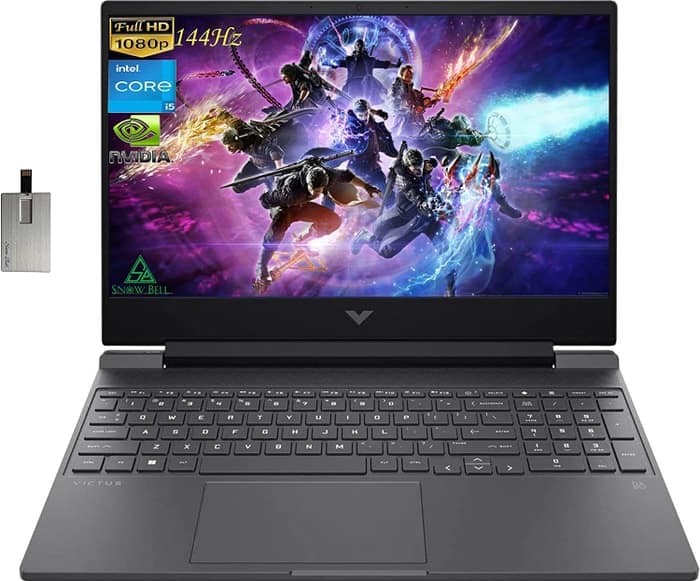
HP Victus
- Delivers smooth gameplay at 1080p.
- Fast SSD.
- No variable refresh rate to reduce screen tearing.
- Some performance loss on CPU under load.
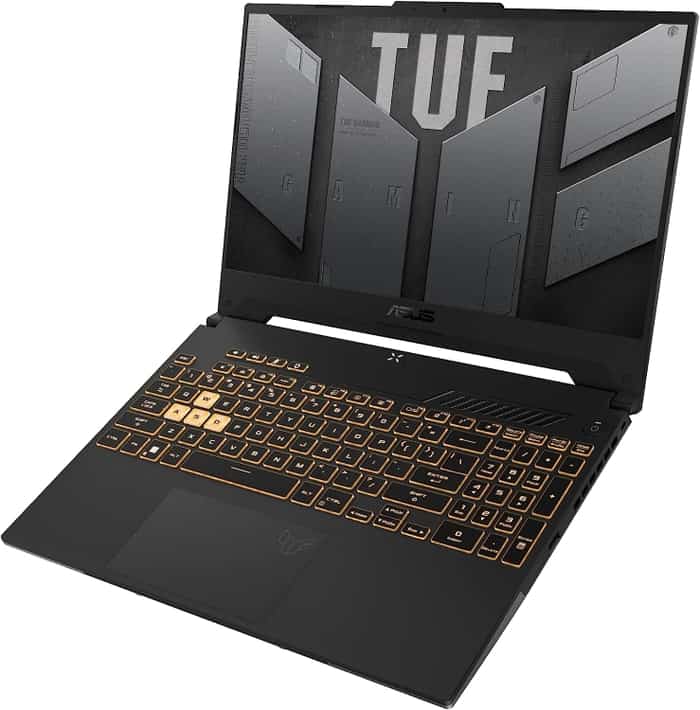
2.ASUS TUF F15 FX507VU-ES53
Affordable gaming laptop with some drawbacks.- Superb 1080p gaming performance
- Strong productivity capabilities
- Great price
- Poor webcam, touchpad, and speakers
- Some games appear washed out on display
Summary
The ASUS TUF F15 FX507VU-ES53 is a budget-friendly gaming laptop that performs well in 1080p gaming and offers strong productivity capabilities. However, it has some drawbacks, including a poor webcam, touchpad, and speakers, as well as a display that may make some games appear washed out.
Alternatives

ASUS TUF Dash F15
- Lightweight and well-built design
- Good selection of inputs and IO
- Some quirks affecting everyday ergonomics
- Ports squeezed together on the left edge

3.ASUS ROG Strix G15
ASUS ROG Strix G15: Unleash your game development potential with high performance and user-friendly maintenance.- High-performance CPU and GPU
- Good workmanship and design
- User-friendly maintenance
- Good display
- Skimpy connectivity
- Coil whine in certain situations
Summary
The ASUS ROG Strix G15 is a powerful gaming laptop with an RTX 3000 GPU and Ryzen 5000 CPU, offering high performance for game development. It boasts a 300 Hz display, good workmanship, sophisticated design, and user-friendly maintenance. However, it has limited connectivity options and may experience coil whine in certain situations.
Reviews
Alternatives
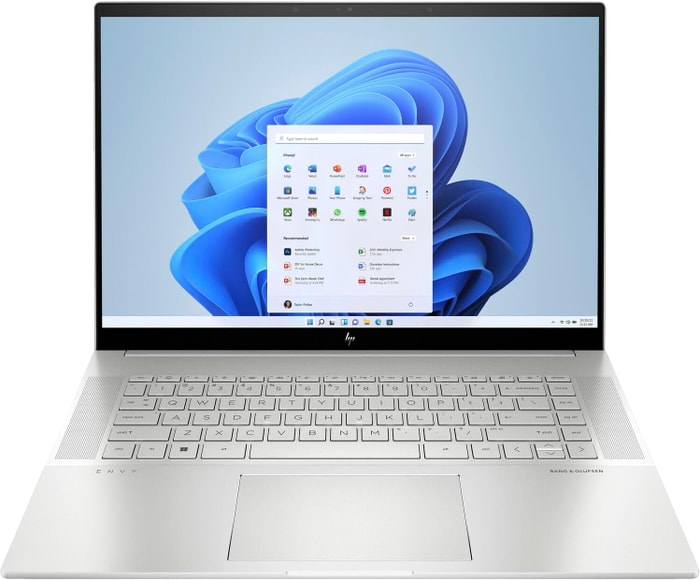 $1,800
$1,800HP Envy 16
- Plenty of CPU and GPU power
- New 120Hz screen refresh rate
- Merely adequate base screen
- Optional OLED has fewer pixels than before
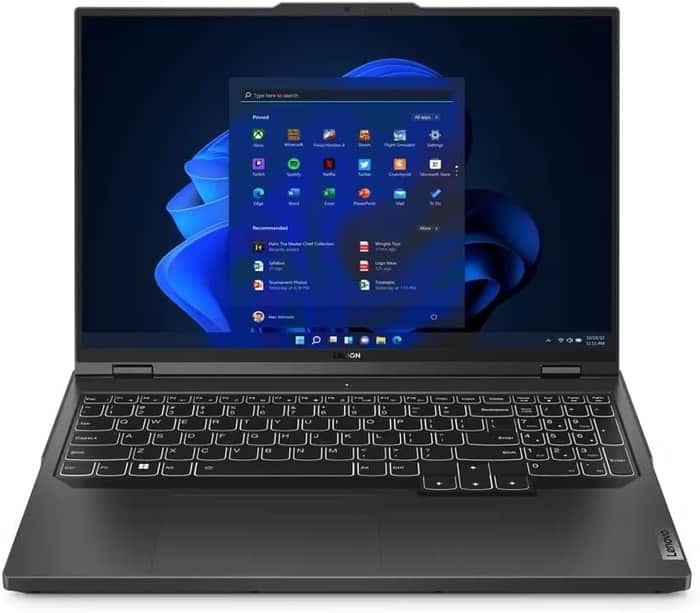
4.Lenovo Legion Pro 5
Lenovo Legion Pro 5: A well-built mid-tier laptop with good performance, but beware of hotspots and limited battery life.- Good build quality and design
- Good screen and IO
- Competent CPU with multiple GPU options
- Competitively priced
- No Thunderbolt or biometrics
- Some hotspots while gaming
- Poor speakers
- So-so battery life
Summary
The Lenovo Legion Pro 5 is a solid mid-tier laptop for game development with Unity, offering good build quality, a good screen, and plenty of performance. However, potential buyers should be aware of hotspots during sustained loads, limited battery life, and subpar speakers.
Reviews
Alternatives
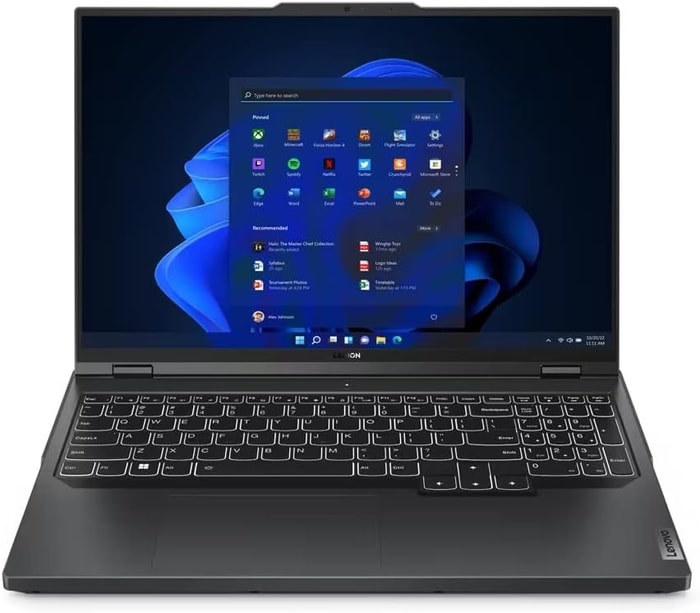 $2,840
$2,840Lenovo Legion Pro 5
- Strong performance for the price
- Quality build and port selection
- Display quality and battery life are just decent
- Bulky and heavy

5.HP Omen 17
HP Omen 17: A high-end gamer with powerful performance, but falls short in noise level and battery life.- QHD display with 165 Hz
- Advanced Optimus
- Expandable working memory
- PCIe-4 SSD (space for a second SSD)
- Slightly below-average performance for a RTX 4080
- High noise level
- Clattery case
- Meager battery life
Summary
The HP Omen 17 is a high-end gaming laptop that offers powerful performance for video processing, rendering, and QHD gaming. With a QHD display, advanced Optimus, and expandable working memory, it provides a great gaming experience. However, it falls short in terms of noise level and battery life.
Reviews
Alternatives
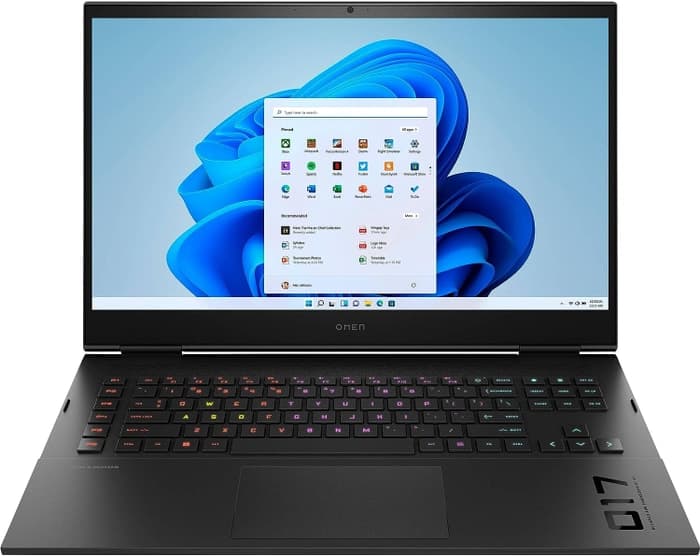
HP Omen
- QHD display with 165 Hz
- Expandable working memory
- Slightly below-average performance for a RTX 4080
- High noise level
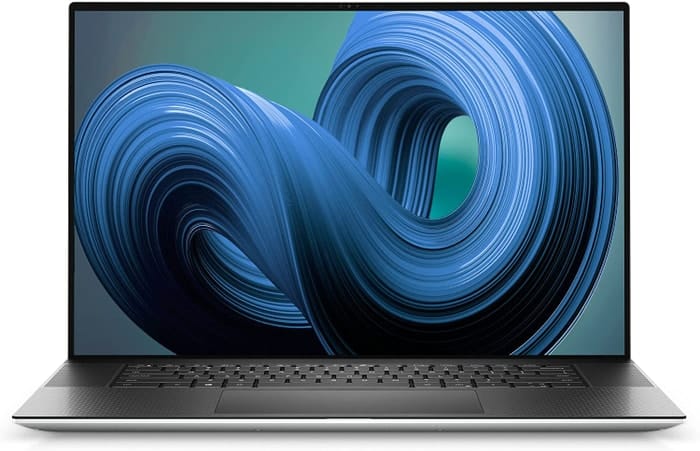
6.Dell XPS 17 9720
Dell XPS 17 9720: A powerful laptop for game development with a stunning 4K display, but with some graphics performance and cooling limitations.- Excellent 4K display with AdobeRGB
- High-quality case
- Thunderbolt 4 PCIe 4.0 support
- Very high system performance
- Lower graphics performance than the predecessor
- Performance not completely stable under combined load
- Not Wi-Fi 6E compatible
- 720p webcam
Summary
The Dell XPS 17 9720 is a top choice for game development with its excellent 4K display, high-quality case, and Thunderbolt 4 & PCIe 4.0 support. However, it falls short in terms of graphics performance compared to its predecessor, and the cooling system could be improved.
Reviews
Alternatives
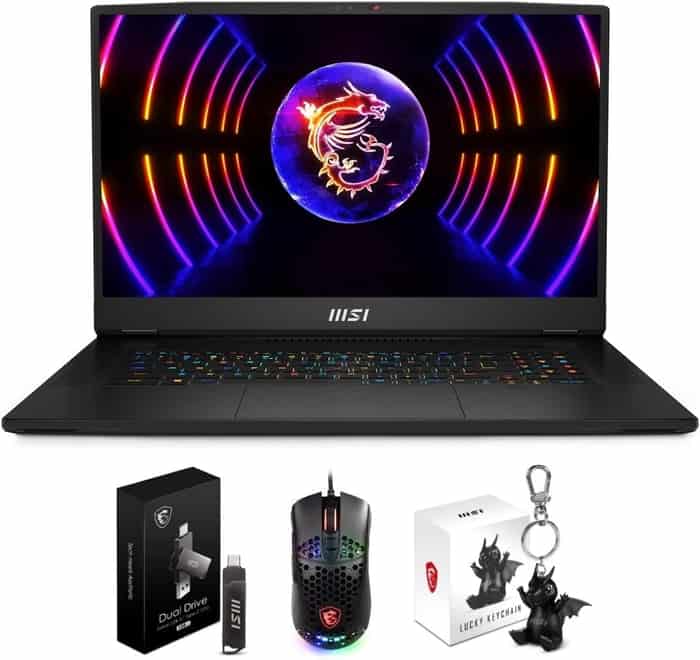
MSI Titan GT77HX 13VI-042US
- Excellent mechanical keyboard
- Class-leading Mini-LED display
- Uninspired design
- Short battery life
Table of the Best Laptops for Game development with Unity
| Laptop | Price (approx) |
| acer Nitro 5 | $680 |
| ASUS TUF F15 FX507VU-ES53 | $1,100 |
| ASUS ROG Strix G15 | $1,750 |
| Lenovo Legion Pro 5 | $2,630 |
| HP Omen 17 | $4,290 |
| Dell XPS 17 9720 | $5,600 |





